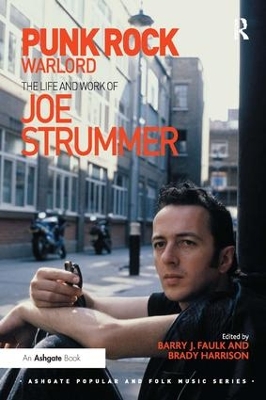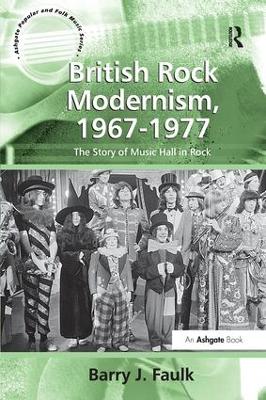Ashgate Popular and Folk Music
2 total works
Punk Rock Warlord: the Life and Work of Joe Strummer
by Dr Barry J. Faulk and Brady Harrison
Published 1 January 2014
Punk Rock Warlord explores the relevance of Joe Strummer within the continuing legacies of both punk rock and progressive politics. It is aimed at scholars and general readers interested in The Clash, punk culture, and the intersections between pop music and politics, on both sides of the Atlantic. Contributors to the collection represent a wide range of disciplines, including history, sociology, musicology, and literature; their work examines all phases of Strummer’s career, from his early days as ’Woody’ the busker to the whirlwind years as front man for The Clash, to the ’wilderness years’ and Strummer’s final days with the Mescaleros. Punk Rock Warlord offers an engaging survey of its subject, while at the same time challenging some of the historical narratives that have been constructed around Strummer the Punk Icon. The essays in Punk Rock Warlord address issues including John Graham Mellor’s self-fashioning as ’Joe Strummer, rock revolutionary’; critical and media constructions of punk; and the singer’s complicated and changing relationship to feminism and anti-racist politics. These diverse essays nevertheless cohere around the claim that Strummer’s look, style, and musical repertoire are so rooted in both English and American cultures that he cannot finally be extricated from either.
British Rock Modernism, 1967-1977 explains how the definitive British rock performers of this epoch aimed, not at the youthful rebellion for which they are legendary, but at a highly self-conscious project of commenting on the business in which they were engaged. They did so by ironically appropriating the traditional forms of Victorian music hall. Faulk focuses on the mid to late 1960s, when British rock bands who had already achieved commercial prominence began to aspire to aesthetic distinction. The book discusses recordings such as the Beatles' Magical Mystery Tour album, the Kinks' The Village Green Preservation Society, and the Sex Pistols' Never Mind the Bollocks, Here's the Sex Pistols, and television films such as the Beatles' Magical Mystery Tour and the Rolling Stones' Rock and Roll Circus that defined rock's early high art moment. Faulk argues that these 'texts' disclose the primary strategies by which British rock groups, mostly comprised of young working and lower middle-class men, made their bid for aesthetic merit by sampling music hall sounds. The result was a symbolically charged form whose main purpose was to unsettle the hierarchy that set traditional popular culture above the new medium. Rock groups engaged with the music of the past in order both to demonstrate the comparative vitality of the new form and signify rock's new art status, compared to earlier British pop music. The book historicizes punk rock as a later development of earlier British rock, rather than a rupture. Unlike earlier groups, the Sex Pistols did not appropriate music hall form in an ironic way, but the band and their manager Malcolm McLaren were obsessed with the meaning of the past for the present in a distinctly modernist fashion.

